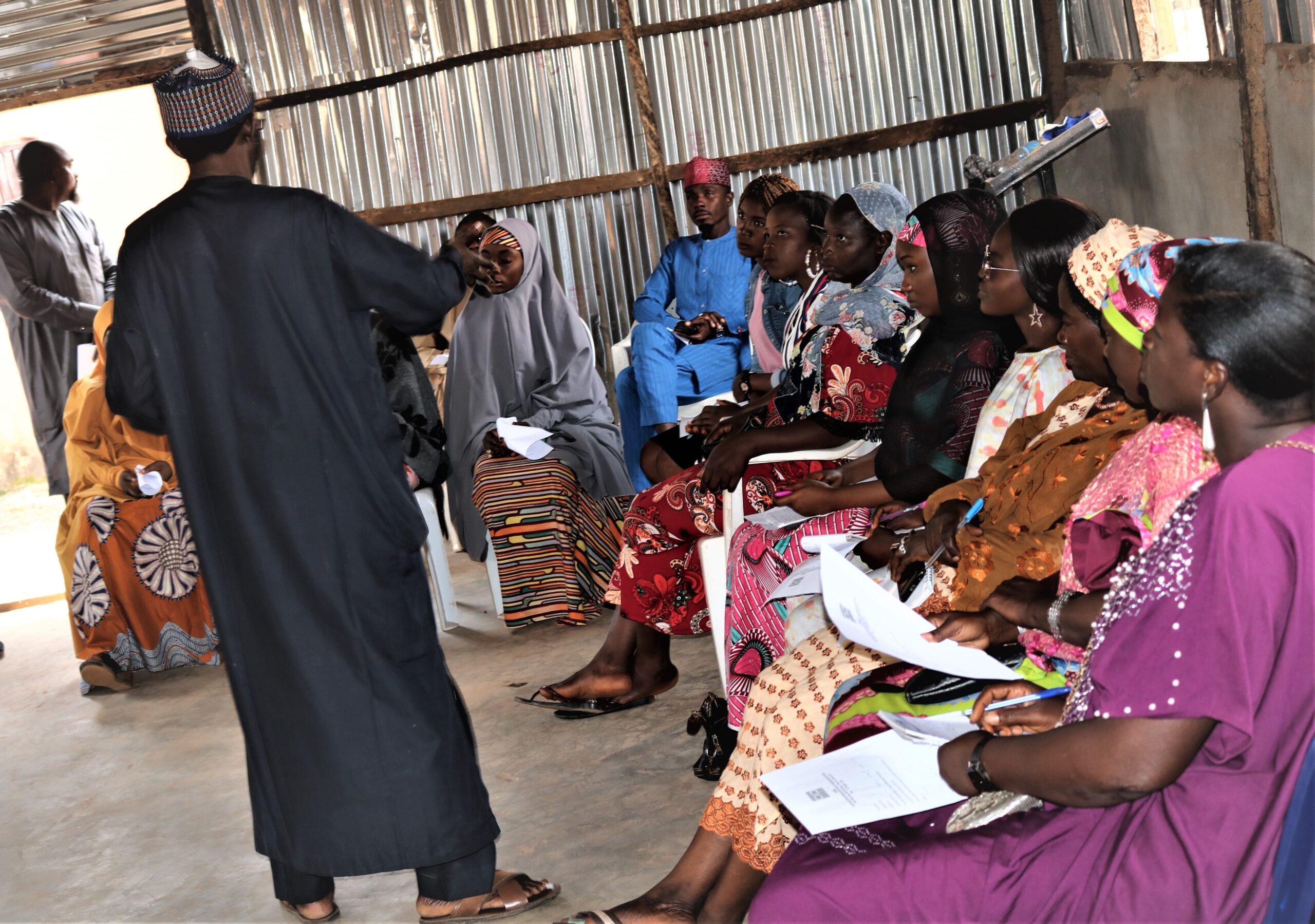About 25 Muslim and Christian women sat on white plastic chairs. They formed what looked like a semicircle inside a small hall – with a corrugated iron roof, belonging to Strongtower Healing and Deliverance Ministry, a local church in Rido Gbagyi in Chikun Local Government Area of Kaduna State.
It was on August 11. Before the women, whose age ranged between 15 and 50, Muhammed Sani Isah stood explaining, among other things, who a “true believer” is.
“A true believer is not seen as a servant of God until he learns how to love people, even those of other religions,” 55-year-old Isah, a Muslim and director of programmes at the Interfaith Mediation Center or IMC (a nonprofit in Kaduna helping religiously divided groups to commit to tolerance and coexistence) explained to the women who listened with rapt attention.
For three months, the women had fed on messages like this from IMC representatives. The messages had been part of a training IMC began giving the women in conflict prevention and peacebuilding. The event of August 11 was the final follow-up session of the tutoring that started in April.
That month, with a grant from the King Abdulla Bin Abdulaziz International Center for Interreligious and Intercultural Dialogue or KAICIID, IMC selected 30 Muslim and Christian women from Kajuru Local Government Area of Kaduna and another 30 from Chikun Local Government Area.
It then trained each group separately for two days focusing on understanding what conflict is, conflict indicators, factors that fuel conflict, early warning and early response to conflict, how communication can contribute to conflict creation or prevention, and how to achieve coexistence through religious tolerance, awareness creation, and forgiveness.
The women from Kajuru were trained for two days at the Kajuru local government council, while those from Chikun were trained at the Lesham Continental Hotel, Barnawa in Kaduna South Local Government Area. IMC followed up once monthly on each group to provide more support and assess their progress and challenges as they worked to implement a set “action plan.”
The action plan involved, first, each woman accepting to live peacefully with other women irrespective of their religious differences; and second, each group (with its chairperson, executives, and other members) meeting twice monthly to plan and storm their communities educating people on the need for tolerance and coexistence.
So far, the women, who call themselves “Girls for Peace” and “Women for Peace”, have recorded some level of success carrying out the plan, including carrying out door-to-door sensitization in their communities.
“Before now, I could not talk to or greet them (Muslims), but since I started this training, I can now enter their house, sit down and eat their food and play with them. They also come to my place,” explained 37-year-old Deborah Emmanuel, one of the Christian participants from Kasuwa Mangani community in Kajuru Local Government Area.
“If I see people fighting, I can enter, talk to them that ‘in this world, there is nothing inside. If you (Muslims and Christians) continue fighting and keeping malice, we would not see good’. I thank God because sometimes they listen to me.”
For Tsaiba Samaila, who is in her 20s and also from Kasuwa Mangani, “I learned a lot of things. Now, my best friend is a Christian; I used to go to her place, she advises me. If I want to do something wrong, she would tell me the truth and put me in a good way. Me too, I used to advise her, she comes to my place, we eat together, and we do everything together. I learned how to do good things to the other people (Christians), teach them and enlighten them to bring peace to the community.”
IMC is using the program to study how effective getting women vitally involved in peacebuilding in local communities can be. If the effort proves very successful, it plans to expand it to other local government areas.
The choice of Kajuru and Chikun local governments for the pilot study was because the two local governments are among several places prone to violent religious clashes in Kaduna, Isah said. At least 55 people died in 2018 during a clash between Muslim and Christian youths in Kasuwa Mangani.
Isah, who is also the imam of Waff Road Mosque in Kaduna, said the exclusive choice of women for the programme is due to IMC’s discovery that in most communities, women were hardly involved in peace talks despite being one of the most affected groups during ethnoreligious conflicts in Kaduna where at least 20,000 people have died in different religious crises since 1980.
“We discovered that women are being left behind in many communities and many projects and issues where we discuss peace and peacebuilding and conflict resolution,” he said.
“Whenever there is any misgiving or any violent conflict, you find out that women and children are the most people in the receiving end. So if that is the case, you have to involve them when talking about peace and peacebuilding and conflict prevention.”
Meanwhile, KAICIID’s representative in Nigeria, Joseph Atang, told PRIME PROGRESS that KAICIID, which is also called The International Dialogue Center, decided to support the women-targeted programme because, “We want to see peace in Chikun, we want to see peace in Kajuru, and, by extension, we want to see peace in Kaduna State.”
“And there are many examples of women who have brought peace to countries, to nations in crisis. In highly destructive conflicts, you find a woman coming in, and stability comes because they are not as destructive as we men,” he adds.
However, there is the question of whether the programme would be sustained. The women and girls groups are expected to mobilize among themselves and self-fund their community activities after the training, with Isah explaining that the small grant from KAICIID was mainly to cover training and education cost for the women.
But since the women are mostly petty traders, smallholder farmers, or small income earners, Deborah, one of the women from Kasuwa Mangani, said she is not sure of her group’s long-term sustenance without monetary support from IMC or other organisations.
“Some of the women are not coming again. They say they are not given anything like transportation [fare], so we are 23 now [in my group],” she said, implying that at least seven women had stopped coming for group activities.
Isah said IMC is monitoring the women’s situation and progress; if their commitment and progress remain encouraging enough, it might consider sourcing for extra funds to support their regular community activities.
He said the most important thing is that the women now have the skills to contribute to peace in their communities and that that had remained the goal and not necessarily to give money as a charity as some of the women might have expected.
However, he said IMC acknowledges that the women need economic power to carry out peacebuilding efforts; that is why IMC plans to provide training in business and agriculture to the women in the coming weeks and months and share interest-free loan opportunities with them.
On August 11, around 25 Muslim and Christian women gathered at Strongtower Healing and Deliverance Ministry in Kaduna State, Nigeria, for the final session of a three-month training on conflict prevention and peacebuilding conducted by the Interfaith Mediation Center (IMC). The program, funded by the King Abdulla Bin Abdulaziz International Center for Interreligious and Intercultural Dialogue (KAICIID), aimed to foster religious tolerance and coexistence among women from Kajuru and Chikun local government areas, regions prone to violent religious conflicts.
IMC trained the women separately on topics including conflict indicators, early response strategies, and achieving coexistence through religious tolerance and forgiveness. Participants, calling themselves “Girls for Peace” and “Women for Peace,” are now working to implement an action plan involving promoting peaceful living and educating their communities on tolerance.
Success stories include improved interactions between Muslims and Christians, with members now visiting each other's homes and mediating conflicts. IMC plans to monitor progress and consider further support, including business and agricultural training, to sustain the women’s peacebuilding efforts.
The choice of women for the program was due to their significant impact during conflicts and their exclusion from peace talks. KAICIID backs the initiative to foster peace in Kaduna, with hopes it will extend to other areas.






